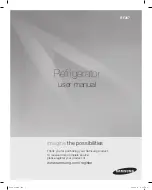
44
Safety instructions
(continued)
Do not install the refrigerator in a damp place, or where it may come into contact with water.
• Deteriorated insulation of electrical parts can cause short circuit, electric shock or fire.
Do not store volatile or flammable substances in the refrigerator.
• Flammable substances such as benzene, thinners, alcohol, ether and Liquid Petroleum Gas (LPG) can cause
explosions.
Do not store pharmaceuticals or other temperature-sensitive products in the refrigerator.
• You should not store products that require strict temperature controls in the refrigerator.
Do not let children climb, swing or hang on the refrigerator door.
• This can cause serious injury, as well as damaging the refrigerator.
Do not operate the refrigerator in the presence of explosive fumes or flammable gas.
• This can cause explosion or fire.
Do not store petrol or other flammable liquids and vapours in the refrigerator, or use them near the appliance.
• This can cause explosion or fire.
-WARNING:
Do not use mechanical devices or other means to accelerate the defrosting process, other than those
recommended by the manufacturer.
• This can cause damage to the interior of the refrigerator or cause an explosion.
-WARNING:
Do not use electrical appliances inside the food storage compartments of the appliance, unless they are of the
type recommended by the manufacturer.
• This can cause explosion or fire.
-WARNING:
Do not damage the refrigerant circuit.
• This can cause explosion or fire.
Do not try to disassemble, repair or modify the refrigerator yourself.
• You may injure yourself – or others – with burns or electric shock, or damage the refrigerator. If your appliance needs
alterations or repair, please consult authorized service centre.
Ensure that the refrigerator is plugged into an earthed mains socket. DO NOT plug into an unearthed mains
socket.
• A short circuit could cause an electrical shock.
Make sure the mains lead and plug are not squashed or damaged.
• A damaged mains plug or lead can cause short-circuit, fire or electric shock.
• If the mains lead is damaged, it must be replaced by the manufacturer, its service agent or similarly qualified persons
in order to avoid a hazard.
• DO NOT ATTEMPT TO REPLACE IT YOURSELF.
Remove any dirt or dust from the mains plug’s pins before connecting to the power supply.
• Dust build-up on the mains plug can cause insulation failure, especially in humid conditions. This can cause short
circuit, fire or electric shock. Unplug the mains lead and wipe it with a dry cloth. Never use a wet or damp cloth.
Plug your appliance into the socket, making sure the connection is secure.
• A loosely connected mains plug can cause fire or electric shock.
Install the refrigerator in a well-ventilated area.
• The more refrigerant there is in an appliance, the larger the room it should be installed in. If there’s a refrigerant fluid
leak, and the appliance is in a small room, the build up of combustible gases is more likely. This can cause fire or
explosion. As a guide, for every 8
g
of coolant, you’ll need at least 1 cubic metre of space in the room. The data plate
inside the appliance tells you how much refrigerant your refrigerator contains.
The refrigerant (R600a) used in the refrigerator and the gases in the insulation material (cyclopentane) are both
flammable. They also require special disposal procedures.
• Before you dispose of the appliance, make sure none of the pipes on the back are damaged. Refrigerant or gas leaks
can cause fire or explosion.
Unplug the refrigerator before cleaning and servicing.
• Failure to do this can cause electric shock.
If you smell burning or see smoke coming from the refrigerator, disconnect the power immediately and please
consult authorized service centre.
• Failure to do this can cause fire or electric shock.





































